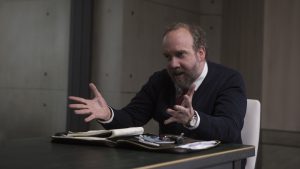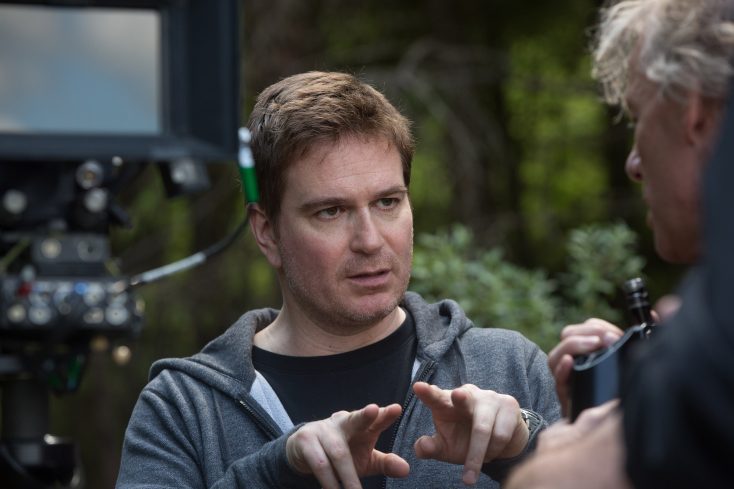
A psychologist (Paul Giamatti) conducts an unusual interview as part of an investigation of a “human” whose actions present a mystery of both infinite promise and incalculable danger in Luke Scott’s MORGAN. ©20th Century Fox. CR: Aidan Monaghan.
By ANGELA DAWSON
Front Row Features
HOLLYWOOD—Ridley Scott and his son, Luke Scott, sit down for a Q&A following an early screening of Luke’s feature directorial debut feature, “Morgan,” a cautionary tale about artificial intelligence. The location is fittingly enough the historic Egyptian Theatre in Hollywood, where some 37 years ago Ridley Scott’s breakthrough sci-fi epic “Alien” premiered. The elder Scott, a four time Oscar nominee, serves as a producer on the sci-fi thriller, written by Seth Owen, in which an experimental being endowed with super-human qualities suddenly and unexpectedly attacks one of her creators.
The company that owns Morgan (played by Anya Taylor-Joy, “The Witch”) sends in a “risk-assessment” expert (played by Kate Mara, “The Martian”) to the remote country estate where the experimental artificial intelligence project is being conducted in secret to determine whether the creation should be destroyed. She runs afoul with Morgan’s caretakers—a mix of scientists, doctors and household staff—who are determined to protect her.
It’s only when Morgan goes on the attack again that the in-house team begins to realize they’ve created a monster, but it may be too late to stop it. The intense drama also stars Toby Jones, Rose Leslie, Boyd Holbrook, Michelle Yeoh, Jennifer Jason Leigh and Paul Giamatti.
Throughout his filmmaking career, Ridley Scott has occasionally delved into cautionary tales about technology, humanity and corporate greed. Among his most notable works: “Blade Runner,” “Prometheus” and the acclaimed “1984” Apple Macintosh commercial.
Luke Scott, 48, previously made short films and served as a second unit director on his father’s “Exodus: Gods and Kings” as well as “The Martian.”
Ridley’s pride in his son was evident as the familial filmmakers spoke about “Morgan.”
Q: Is Morgan a “she” or an “it?”
Luke: Morgan is an “it.” She always was intended to be androgynous and gender-less.
Q: How did you come across this script?
Luke: It was a happy accident because I wrote a short film called “Loom,” which was kind of a similar Frankenstein-type story. Folks asked me to expand on it. In that period, another (Seth Owen’s) script came to my attention and there was one scene that struck me and the way I got into it was the interview scene (between Anya and Paul Giamatti) in the laboratory. It ran 20 or more pages. It was an intense scene.
Q: Does Morgan have feelings?
Luke: I think she has genuine remorse (for her actions). The character of Morgan is a real tragedy because, in my mind, she’s a great success as a human.
One thing I’d like to point out, the set (where Morgan is confined) itself has a footprint of a human womb.
Q: Ridley, because many of your films have dealt with A.I. vs. humanity, with time has your concern about that changed in a significant way? Are you more or less concerned now about advances in A.I.?
Ridley: It’s more feasible and more inevitable now. If we let them do it, they’d definitely have a go—whoever “they” are. It’s not going to happen in this country (the U.S.) but in other countries I imagine it’s already begun. It’s already happening.
We’re so far down the line in speculation far more than it’s been discussed. If you get the smartest computer that you could design, the first thing you’re going to do is design another computer that is smarter. Then you get these two computers to commune. Once you do that, then you’re in real trouble. They’re so far ahead of you. So you always have to keep your hand on it.
Q: You’re concerned it would have the ability to surpass you exponentially?
Ridley: I think they’ve done that already. There are those supercomputers.
Q: Do people in the scientific world randomly contact you to share their developments because of your body of film work?
Ridley: I’ve had really good experiences with NASA and the Jet Propulsion Laboratory. JPL engineers have long hair and flip flops because they make engines and machines and NASA engineers wear suits and ties because they make engines and machines and send human beings up there (to space). They work together pretty well. They would say to me, “What are you going to base your spacesuits on,” and I would say, “Show me yours and I’ll show you mine.” So they showed me their spacesuits, and I said, “They’re terrible.” And they said, “We know. Can we borrow yours?” (He laughs.)
It’s interesting to watch their evolution because astrophysics, supermathematics, is an art form. Science is art. It’s a bit like being a brilliant screenwriter—you’re screwing around with abstracts until you form order. That’s mathematics. No difference.
Q: What poses a greater challenge: bioengineered superhumans or humanoid robots?
Luke: Bioengineered humans are far more likely than we would like. They offer the greatest challenge to humanity because once the germ gets into the species it’s goodbye to humans, part 1, and hello to humans, part 2.
Q: Do you keep any souvenirs from your sets?
Ridley: I kept one teeny spacesuit from “Alien.” I was standing on the set up 45 feet and looking at a landing leg (from the space craft). I was looking at it thinking, “It’s not big enough.” And, of course, I have these three astronauts, including Sigourney (Weaver), who are about six feet tall. There was an elevator where the specimen would come down on it. We had four days to go and so I had a spacesuit made for three (little people) and the child of the cameraman. And I stuck them up there and suddenly (the aircraft) leg looked 60 feet tall. We didn’t have miniatures so I had to wire my kids to it because they were up there. I still have that suit.
Luke: I just have sweet memories. And I keep my storyboards.
Q: What trait does Morgan have that you wished you had?
Ridley: Over the years, you learn not to compromise. When you’re beginning, you tend to compromise for all kinds of reasons. Usually, it’s because of insecurity. You’re on a new treadmill; you’re in a new game. Also, you don’t know quite what you’re doing. In my case, I learned as I was going. There was no formal training. I just made mistakes and gradually you learn not to compromise. I no longer compromise, not that much.
The thing is when you get really experienced, it can either spell out that there is going to be a dullness attached to it, or when you get really really experienced, it means you don’t know what you’re doing. I still leave it open to the thespians—the actors—who want to say it this way or that way, and I always leave that open.
The key, if you’re going to do my job, is knowing what you’re going to do when you walk onto the set.





